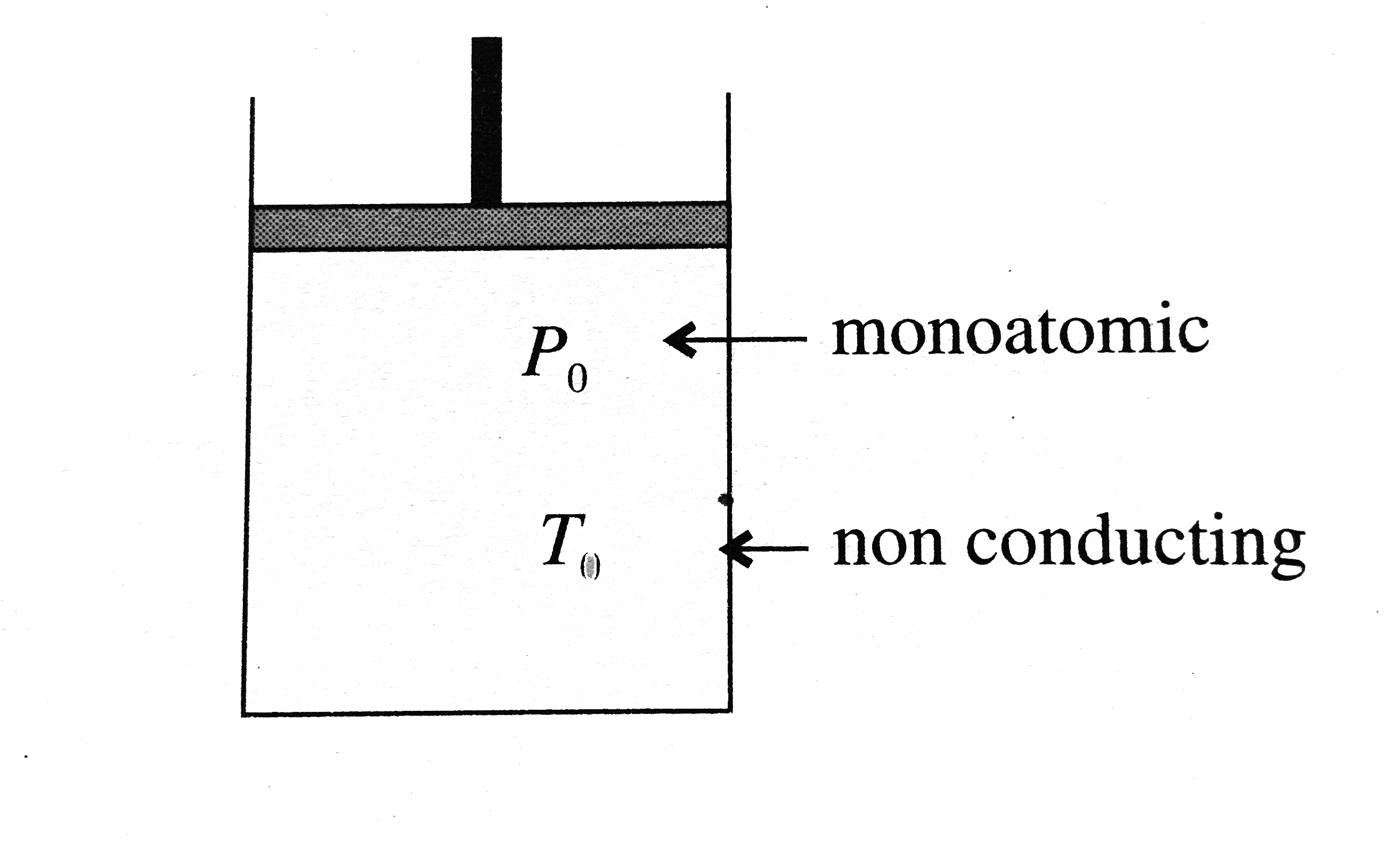A gas for which γ=1.5 is suddenly compressed to 1/4 th of the initial volume. Then the ratio of the final to initial pressure is
1:6
1:8
1:4
8:1
The correct Answer is:D
To solve the problem, we need to find the ratio of the final pressure P2 to the initial pressure P1 when a gas is compressed to 14 of its initial volume. Given that the value of γ (gamma) is 1.5, we can use the relationship between pressure and volume for an adiabatic process.
1. Understanding the Adiabatic Process:
For an adiabatic process, the relationship between pressure and volume is given by:
P1Vγ1=P2Vγ2
where P1 and V1 are the initial pressure and volume, and P2 and V2 are the final pressure and volume.
2. Setting Up the Volumes:
We know that the gas is compressed to 14 of its initial volume, so:
V2=14V1
3. Substituting Values:
Substitute V2 into the adiabatic equation:
P1Vγ1=P2(14V1)γ
4. Simplifying the Equation:
This can be rewritten as:
P1Vγ1=P2(Vγ14γ)
Rearranging gives:
P2=P1⋅4γ
5. Calculating the Pressure Ratio:
Now, we need to find the ratio P2P1:
P2P1=4γ
6. Substituting the Value of Gamma:
Since γ=1.5:
P2P1=41.5
7. Calculating 41.5:
We can express 41.5 as:
41.5=(22)1.5=23=8
8. Final Result:
Therefore, the ratio of the final pressure to the initial pressure is:
P2P1=8
This can be expressed as:
P2:P1=8:1
Conclusion:
The ratio of the final pressure to the initial pressure is 8:1.
For an adiabatic process, the relationship between pressure and volume is given by:
P1Vγ1=P2Vγ2
where P1 and V1 are the initial pressure and volume, and P2 and V2 are the final pressure and volume.
We know that the gas is compressed to 14 of its initial volume, so:
V2=14V1
Substitute V2 into the adiabatic equation:
P1Vγ1=P2(14V1)γ
This can be rewritten as:
P1Vγ1=P2(Vγ14γ)
Rearranging gives:
P2=P1⋅4γ
Now, we need to find the ratio P2P1:
P2P1=4γ
Since γ=1.5:
P2P1=41.5
We can express 41.5 as:
41.5=(22)1.5=23=8
Therefore, the ratio of the final pressure to the initial pressure is:
P2P1=8
This can be expressed as:
P2:P1=8:1
The ratio of the final pressure to the initial pressure is 8:1.
Similar Questions
A mixture of gases at NTP for which γ=1.5 si suddenly compressed to 19th of its original volume. The final temperature of mixture is
View SolutionConisder a gaseous reaction, the rate of which is given by k[A][B]. The volume of the reaction vessel containing these gases is suddenly reduced to 1/4th of the initial volume. The rate of the reaction as compared with original rate is
View Solution
Knowledge Check
A gas is suddenly compressed to 14th of its original volume. Caculate the rise in temperature when original temperature is 27∘C.γ=1.5.
Aa.400 KBb.500 KCc.600 KDd.700 KA monoatomic gas is compressed adiabatically to 1(4)th of its original volume , the final pressure of gas in terms of initial pressure P is
A7.08 PB8.08 PC9.08 PD10.08 P
400cc volume of gas having γ=52 is suddenly compressed to 100cc. If the initial pressure is P, the final pressure will be
View SolutionA monoatomic gas is enclosed in a nonconducting cylinder having a piston which can move freely. Suddenly gas is compressed to 1/8 of its initial volume. Find the final pressure and temperature if initial pressure and temperature are P0 and T0 respectively.

View SolutionA monoatomic gas is enclosed in a non-conducting cylinder having a piston which can move freely. Suddenly gas is compressed to 1/8 of its initial volume. Find the final pressure and temperature if initial pressure and temperature are P0 and T0 respectively.

View SolutionA diatomic gas which has initial volume of 10 liter is isothermally compressed to 1/15th of its original volume where initial pressure is 105 Pascal. If temperature is 27∘C then find the work done by gas
View SolutionA monoatomic gas (γ=5/3) is suddenly compressed to (1/8) of its volume adiabatically then the pressure of the gas will change to
View SolutionA mass of dry air at N.T.P. is compressed to 132 th of its original volume suddenly. If γ=1.4 find the final pressure of the gas if initial pressure is P.
View Solution
